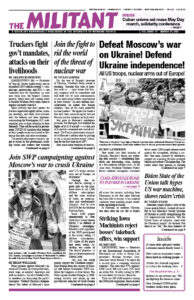The Struggle Against Fascism in Germany by Russian revolutionary leader Leon Trotsky is this week’s Books of the Month selection. Written during the heat of battle against the rising Nazi movement in the early 1930s, he explains the counterrevolutionary course of the Stalinized Communist Party, which split the workers’ movement enabling Hitler to come to power without firing a shot. Trotsky insistently called for a united front and defense guards by workers on the road to power by the working class and its allies. The excerpt is from his March 14, 1933, article, “The Tragedy of the German Proletariat — The German Workers Will Rise Again — Stalinism, Never!” Copyright © 1971 by Pathfinder Press. Reprinted by permission.
The most powerful proletariat of Europe, measured by its place in production, its social weight, and the strength of its organizations, has manifested no resistance since Hitler’s coming to power and his first violent attacks against the workers’ organizations. This is the fact from which to proceed in subsequent strategic calculations. …
Before decisive battles will become possible, the proletarian vanguard will have to reorient itself; that is to say, it will have to understand what has happened, assign the responsibility for the great historical defeat, trace out the new road, and thus regain confidence in itself.
The criminal role of the Social Democracy requires no commentary: the Comintern was created fourteen years ago precisely in order to snatch the proletariat from the demoralizing influence of the Social Democracy. If it has not succeeded up to now, if the German proletariat found itself impotent, disarmed, and paralyzed at the moment of its greatest historic test, the direct and immediate blame falls upon the leadership of the post-Leninist Comintern. That is the first conclusion which ought to be drawn immediately. …
Since 1923 … the Stalinist leadership, although indirectly, assisted the Social Democracy with all its strength to derail, to befuddle, to enfeeble the German proletariat: it restrained and hindered the workers when the conditions dictated a courageous revolutionary offensive; it proclaimed the approach of the revolutionary situation when it had already passed; it worked up agreements with petty-bourgeois phrasemongers and windbags; it limped impotently at the tail of the Social Democracy under cover of the policy of the united front; it proclaimed the “third period” and the struggle for the conquest of the streets under conditions of political ebb and the weakness of the Communist Party; it replaced the serious struggle by leaps, adventures or parades; it isolated the Communists from the mass trade unions; it identified the Social Democracy with fascism and rejected the united front with the mass workers’ organizations in face of the aggressive bands of the National Socialists; it sabotaged the slightest initiative for the united front for local defense, at the same time it systematically deceived the workers as to the real relationship of forces, distorted the facts, passed off friends as enemies and enemies as friends — and drew the noose tighter and tighter around the neck of the party, not permitting it to breathe freely any longer, nor to speak, nor to think.
Out of the vast literature devoted to the question of fascism it is enough to refer to the speech of Thaelmann, official leader of the German Communist Party, who, at the plenum of the Executive Committee of the Communist International in April 1931, denounced the “pessimists.”… Referring to the creation of defense groups by the Social Democracy, Thaelmann demonstrated in the same speech that these groups differ in no respect from the shock troops of the National Socialists and that both of them are likewise preparing to annihilate Communism.
Today, Thaelmann is under arrest. Faced with triumphant reaction, the Bolshevik-Leninists are in the same ranks as Thaelmann. But the policy of Thaelmann is the policy of Stalin, that is, the official policy of the Comintern. It is precisely this policy which is the cause of the complete demoralization of the party at the moment of danger, when the leaders lose their heads, when the party members, unaccustomed to thinking, fall prostrate, when the principal historic positions are surrendered without a fight. A false political theory bears within itself its own punishment. The strength and the obstinacy of the apparatus only augment the dimensions of the catastrophe.
Having surrendered to the enemy everything that could be surrendered in such a short space of time, the Stalinists are trying to rectify the past by means of convulsive acts, which only more brightly illuminate the whole chain of crimes committed by them. Now that the press of the Communist Party is stifled, now the apparatus is destroyed, now the bloody pennant of fascism waves with impunity over the Karl Liebknecht House, the Executive Committee of the Comintern is starting out on the road of the united front not only from below but also from above. The new zigzag, sharper than all that preceded it, has not, however, been effected on the impulse of the ECCI itself; the Stalinist bureaucracy has abandoned the initiative to the Second International. …
In a special appeal of the ECCI on March 5, “To the Workers of All Countries,” the Stalinists do not say a word about social fascism as the main enemy. They no longer speak about the great discovery of their leader: “The Social Democracy and fascism are not antipodes but twins.” They no longer insist on saying that the struggle against fascism demands as a preliminary the defeat of the Social Democracy. They do not breathe a word about the inadmissibility of the united front from above. On the contrary, they carefully enumerate those cases in the past where the Stalinist bureaucracy, unexpectedly for the workers and for itself, found itself forced to improvise proposals for the united front to the reformist summits. Thus do artificial, false, and charlatanesque theories founder in the fury of the historical tempest. …
The German proletariat will rise again, Stalinism — never. Under the terrible blows of the enemy, the advanced German workers will have to build up a new party. The Bolshevik-Leninists will give all their forces to this work.


